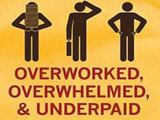Study Says, That More Than Being Underemployed, It’s Being Underpaid That Bothers Them
Post Views 1
According to a Bankrate.com survey released on Wednesday a majority of the US households have salaries that have remained stationary for quite some time now, even though the inflation and cost of living has not.
People are worried about paying mortgages and down debts and have curtailed their spending and adopted thrift and austerity measures.
Inflation-adjusted median family from its high of $64,000 in 2000 has fallen by 6 percent. The median hourly wage was lower in 2011 than it was a decade earlier. Pay is simply not keeping up with employee expenses: adjusted for inflation.
Sam Chea, 38, who lives in Oakland and works nights delivering pizzas for Dominos said, “Everything’s gone up. Rent went up, gas went up, food went up, milk went up, cheeseburgers went up, even cigarettes went up. I’m used to getting a haircut for $6 or $7, but they charged me $9. Even haircuts have gone up.”
It seems that everything apart from the pay packets has gone up.
Bankrate.com in its survey looks at job security, savings, debt, net worth and the overall financial situation of consumers before determining the Financial Security Index. This year the index reached its lowest level since March and its largest fall since last August. The survey was based on telephonic interviews with a thousand adults.
Strangely, even though the unemployment rate is still above 8 percent, job-security remained fairly strong on the index and was the least affected part of the index. Most of the people interviewed said that the jobs outlook factor was one that reflected the most improved part of the Index, for this year.
“What’s really undermining consumer progress on financial security are stagnant wages,” said Greg McBride, Bankrate’s senior financial analyst. “If incomes aren’t growing it’s difficult for people to make headway on debt and savings.”
In June the US Commerce Department has reported that consumer spending remained unaffected and in May remained fairly still and unmoving.
The “fiscal cliff’ is what the businesses are finding difficult to surmount and uncertainty prevailing over it is preventing many businesses from taking on new employees, enlarging their businesses and pumping in more money.
The “fiscal cliff” refers to $600 billion worth of tax hikes and spending cuts that could become a reality in January if Congress does not find conciliation. The lawmakers have a difficult choice ahead of them.
It is something that they will have to take a decision on coming to the end of 2012. They can either allow the policy to become law, which means that people will be burdened with new taxes and spending cuts that will be a huge constraint on growth and probably re-usher in the recession. The congress can also withdraw all or some of the scheduled tax increases and spending cuts, which would further increase the deficits and put the US in a similar position as the economically troubled areas of Europe.
Economists are warning that it could drive the US economy into reverse gear. “The economy is still stuck in first gear,” said Greg McBride.
Study Says, That More Than Being Underemployed, It's Being Underpaid That Bothers Them by Harrison Barnes


 Best and Worst States for Teachers to Teach
Best and Worst States for Teachers to Teach  San Diego County Back to Full Employment
San Diego County Back to Full Employment  10 Jobs with the Fastest Growing Salary in 2017
10 Jobs with the Fastest Growing Salary in 2017  Top Five Reasons Talented Employees Quit
Top Five Reasons Talented Employees Quit  Top 10 Universities to Produce Hedge Fund Workers
Top 10 Universities to Produce Hedge Fund Workers  Job Growth Expected in West Michigan Through 2015
Job Growth Expected in West Michigan Through 2015